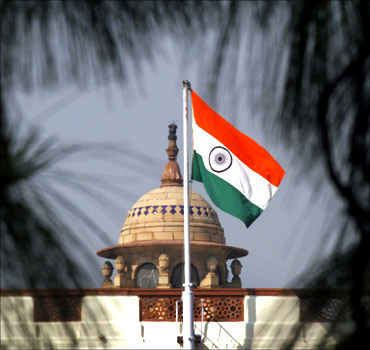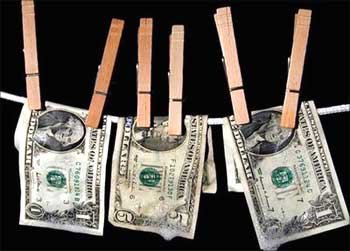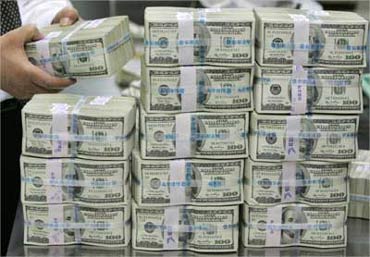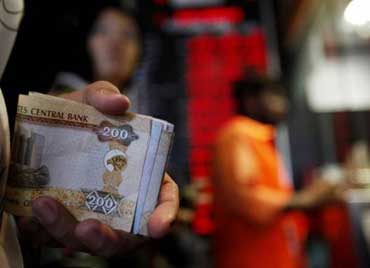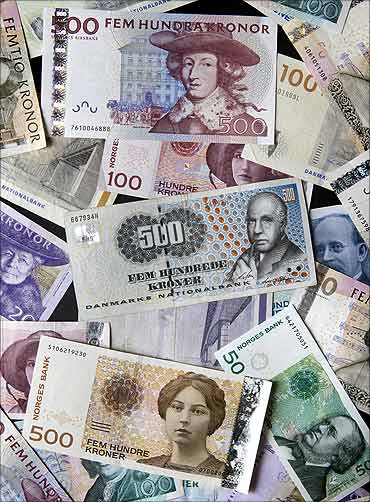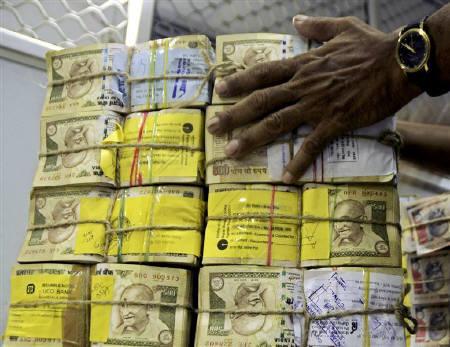 | « Back to article | Print this article |
Black money: Supreme Court's no confidence in government
For some, their expansive vocabulary has failed them. Some have called it a resounding slap in the face of the government. Some have simply smiled at the discomfiture of the government.
Some constitutional experts, while welcoming the decision, have in private conversations termed this as a blatant overreach of the judiciary.
Surely, the interim order of the Bench of Justice B Sudershan Reddy and Justice S S Nijjar, on appointing a Special Investigation Team to monitor the black money issue, has set the Yamuna on fire.
Perhaps never in the history of independent India has one pillar of the Constitution implicitly castigated another pillar -- the executive, in this case -- as heavily as the Supreme Court has done this time.
Click NEXT to read on . . .
Black money: SC's no confidence in government
And this order of the Supreme Court will surely have serious repercussions not only on the functioning of this government, but also on succeeding ones.
What is interesting to note is that in the said order, the court noted that it was worried not merely of the quantum of monies said to have been secreted away in foreign banks, but also the brazen manner in which they may have been taken away from the country.
The court further noted that such monies may endanger the nation, both in terms of the concentration of economic power and the possible transfer of such funds to forces inimical to the nation.
Interestingly, the court was also worried about such monies being transferred abroad and then routed back to India. In the opinion of the court, this created a culture that extolled the virtue of such 'cycles.'
Click NEXT to read on . . .
Black money: SC's no confidence in government
Finally, the court realised the systemic incapacities, in terms of institutional resources, in keeping an account of the monies generated by various facets of social action in the country. This, the court opined, prevented the development of effective response mechanisms.
Distressed at these negative developments, the Supreme Court observed that these incapacities go to the very heart of constitutional imperatives of governance.
The need for an SIT
The Supreme Court noted that large amounts of unaccounted monies were stashed away in banks located in jurisdictions that thrive on strong privacy laws protecting bearers of those accounts to avoid scrutiny.
This, the court concluded, clearly indicates a compromise of the ability of the State to manage its affairs in consonance with what is required from a constitutional perspective. Strong words, indeed.
Click NEXT to read on . . .
Black money: SC's no confidence in government
It does not require a constitutional pundit to state that this failure reflects failure of the State in India. What is interesting is that the Supreme Court has rationalized that beyond 'a particular point, the State may spin into a vicious cycle of declining moral authority, thereby causing the incidence of unlawful activities'.
The court rightly concluded that the quantum of such monies may be rough indicators of the 'weakness of the State'. Depending on the volume of such monies, and the number of incidents through which such monies are generated and secreted away, it may very well reveal the degree of 'softness of the State'.
More to the point, the court pointed out in a soft State there is a greater likelihood of an unholy nexus between the lawmaker, the law keeper and the law breaker.
Naturally the court concluded that if the State is soft -- especially in tackling the unholy nexus between the law makers, the law keepers, and the law breakers -- the moral authority and also the moral incentives to exercise suitable control over economy and society would vanish.
Click NEXT to read on . . .
Black money: SC's no confidence in government
Expressing serious reservations on the responses of the government the court stated that its attempts in tackling the issue of black money were clearly evasive, confusing or in denial mode. It was only upon being repeatedly pressed by the court did the government begin to admit that indeed the investigation was proceeding very slowly.
Further, the court charged the government of India with lacking in seriousness in the absence of satisfactory explanation of the slowness of the pace of investigation.
This, according to the court, was contrary to the requirements of law and constitutional obligation of the government. Surely, the Supreme Court could not have been more pointed.
What has irked the court is that during the ongoing interrogation of Hassan Ali Khan and the Tapurias, (according to an affidavit filed in the Supreme Court by the Government of India, these accused owe the government in excess of Rs 70,000 crore in taxes), names of important persons have cropped up. Yet, no significant attempt has been made to investigate and verify the same.
Click NEXT to read on . . .
Black money: SC's no confidence in government
In short, the attempts of the government were more towards obfuscation than to get at the truth. Surely the Supreme Court was in no mood to accept this approach of the government on such a serious and sensitive matter.
In fact the submission of the government in constituting a high level committee under the aegis of the Union ministry of finance also did not excite the court.
It noted: 'While it would appear, from the status reports submitted to this court, that the Enforcement Directorate has moved in some small measure, the actual facts are not comforting to an appropriate extent. In fact, we are not convinced that the situation has changed to the extent that it ought to so as to accept that the investigation would now be conducted with the degree of seriousness that is warranted.'
What is interesting to note here is that the chargesheet was filed in the case of Hassan Ali. Upon inquiry by the court as to whether the chargesheet had been vetted by the HLC, the counsel for Union of India was 'flummoxed'.
Click NEXT to read on . . .
Black money: SC's no confidence in government
The fact was that the chargesheet had not been given even for perusal to the HLC, let alone to secure its inputs, guidance and direction. So much for the HLC!
From the status reports, the court concluded that it is clear that the problem is extremely complex, and many agencies and departments spread across the country have not responded with the alacrity and urgency that one would desire.
Moreover, the government of India has been unable to answer any of the questions regarding its past actions, and their implications, such as the slowness of the investigation.
In any other democracy, such a government would have resigned
Given this situation, the court was left with no option but to convert the government appointed HLC into an SIT under the chairmanship of a sitting judge of the Supreme Court. The SIT so constituted has been vested with sweeping responsibilities and duties of investigation, initiation of proceedings and prosecution.
Click NEXT to read on . . .
Black money: SC's no confidence in government
Simply put, what was to be done by the executive is now to be done by a court appointed SIT. In any other democracy that would be seen as an expression of a no confidence by the Supreme Court on the functioning of the government, but not in India.
The government however does not even feel slighted by the observations of the court.
Whatever it be, the Supreme Court does not seem to trust the government on this issue. More to the point, the efforts of the government do not seem to inspire confidence of the court.
A thick skin is a gift, not necessarily limited to the Rhinoceros. That extends to governments too. Interestingly, the Opposition seems to enjoy the discomfiture of the government little realizing the gravity of the situation and the seriousness of the matter.
Click NEXT to read on . . .
Black money: SC's no confidence in government
In mature democracies, the Opposition would have put the government on the mat by now.
Given the observations made by the Supreme Court of the country, any government in any democracy would have resigned, especially on the charge of slow pace of investigation.
This demand is all the more tenable particularly when several prominent politicians, businessmen and celebrities are alleged to have been involved in stashing away wealth abroad.
Appointing the SIT is in effect a subtle but definitive expression of no confidence by the Supreme Court in the government of the day. Unfortunately, the government pretends that it is not so.
Click NEXT to read on . . .
Black money: SC's no confidence in government
So does the Opposition which is inexplicably quite on this issue. In the process, democracy is silently smothered where the government virtually merges with the Opposition to form a ruling elite: a situation where the government and the Opposition 'unite', so to speak, to fight inconvenient issues. That is the crux of the issue.
And that is the real tragedy for India. There is no ruling party or Opposition but only ruling elite in India. The SIT has to tackle this monster before attempting to bring our stolen wealth stashed in banks in tax havens overseas.
The moot point is: will it be allowed by the ruling elite to succeed?
The author is a Chennai-based chartered accountant. Comments can be sent to mrv@mrv.net.in
